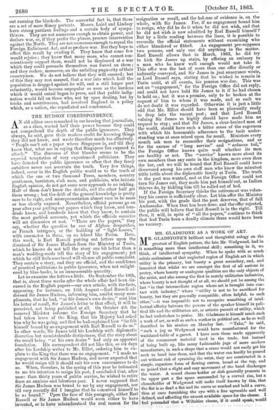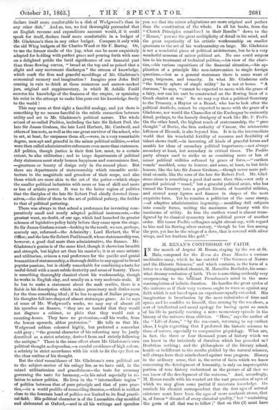MR. GLADSTONE AS A WORK OF ART.
MR. GLADSTONE'S brilliant and thoughtful eulogy on the greatest of English-potters, the late Mr. Wedgwood, had in it something more than intellectual skill ; something in it, we think, of intellectual sympathy. When he spoke with so much subtle enthusiasm of that neglected region of English art in which utility is the primary, but beauty a great secondary, end, and lamented that whilst we are amongst the first of all nations in poetry, where beauty or analogous qualities are the only objects of the artist, and also among the first in merely utilitarian industries, where beauty is not thought of at all, we should yet be among the last "in that intermediate region where art is brought into con- tact with industry," where "utility is not to be sacrificed for beauty, but they are generally compatible, often helpful, to each other,"—it was impossible not to recognize something of intel- lectual affinity between the powers of the speaker`himself in poli- tical life and the utilitarian art, or artistic pursuit of utility, which he had undertaken to praise. Mr. Gladstone is himself much such a work of art, as well as such a worker in political art, as he so well described in his oration on Monday last. " Take," he said, "such a jug as Wedgwood would have manufactured for the washhand-table of a garret. I have seen these made apparently of the commonest material used in the trade, but instead of being built up, like many fashionable jugs of more modern manufacture, in such a shape that a crane would not easily get his neck to bend into them, and that the water can hardly be poured out without risk of spraining the wrist, they are constructed in a simple, capacious form of flowing curves, broad at the top, and so poised that a slight and easy movement of the hand discharges the water. A round cheese holder or dish generally presents in its upper part a flat space surrounded by a curved rim, but a cheeseholder of Wedgwood will make itself known by this, that the fiat is so dead a flat and its curve so marked and bold a curve, thus at once furnishing the eye with a line agreeable and well defined, and affording the utmost available space for the cheese. I feel persuaded that a Wiltshire cheese, if it could speak, would
declare itself more comfortable in a dish of 1Vedgwood's than in any other dish." And so, too, we feel thoroughly persuaded that an English revenue and expenditure account would, if it could speak for itself, declare itself more comfortable in a budget of Mr. Gladstone's than in any other budget. Compare it only with the old Whig budgets of Sir Charles Wood or Sir F. Baring. Or, to use the former simile of the -jug, what can be more exquisitely adapted for holding with perfect grace and pouring forth with ease on a delighted public the lucid significance of our financial past than those flowing curves, " broad at the top and so poised that a slight and easy movement discharges " the stream of knowledge, which mark the firm and graceful mouldings of Mr. Gladstone's economical memory and imagination? Imagine poor John Bull craning in vain to drink at those numerous and narrow-necked jars, original and supplementary, in which M. Achille Fould secretes his knowledge of the finances of the empire, or spraining his wrist in the attempt to make him pour out his knowledge freely to the world !
This may seem at first sight a fanciful analogy, and yet there is something by no means fanciful in the subtle connection between utility and art in Mr. Gladstone's political nature. The whole school of so-called Peelites, including the late Sir Robert Peel, the late Sir James Graham, the late Lord Herbert, Mr. Cardwell, and others of less note, as well as the one great survivor of the school, who in art, at least, far surpasses them all,—were, in a very remarkable degree, men apt and graceful in the minor political utilities,—what were then called administrative reformers even more than statesmen. All politics, though justice is their first law, must, to a certain extent, be also utilitarian ; and in large departments of political duty statesmen must study human happiness and convenience first, —greatness or beauty of design only in the second place. But there are departments of statesmanship which resemble archi- tecture in the magnitude and grandeur of their scope, and also those which are more akin to the art of the potter —which shape the smaller political industries with more or less of skill and more or less of artistic power. It was to the latter region of politics that the disciples of the late Sir Robert Peel chiefly devoted them- selves,—the abler of them to the art of political pottery, the feebler to that of political pottering.
There was always in that school a preference for inventing com- paratively small and neatly adapted political instruments,—the greatest want, no doubt, of our age, which had launched its greater schemes of legislative policy fairly before they came upon the stage. So Sir James Graham recast—looking to the result, we can, perhaps, scarcely say, reformed—the Admiralty ; Lord Herbert, the War Office; and the late Sir Robert Peel himself, whose statesmanship was, however, a good deal more than administrative, the finance. Mr. Gladstone's genius is of the same kind, though it shows less breadth and strength, but higher art than his master's; it is at once artistic and utilitarian, evinces a real preference for the pacific and genial humanities of statesmanship, a thorough dislike to any appeal to broad popular passions, but is chiefly remarkable for combining a taste for useful detail with a most subtle dexterity and sense of beauty. There is something thoroughly classical about his workmanship, though he works in English clay, and usually on a very moderate scale. If he has to make a statement about the malt credits, there is a finish in his description which makes promissory malt duties seem for the time something ideal ; if he has to speak of Italian progress, his thoughts fall into shapes of almost statuesque grace. As lie says of some of Mr. Wedgwood's works, we may say of almost all his speeches on finance, " they are so tasteful that they would not disgrace a cabinet, so plain that they would suit a counting-house. They have no pretension,—all his works, from the lowest upwards, abhor pretension." He tells us that Mr. Wedgwood seldom coloured highly, but preferred a somewhat cold grey ; " the general character of his colouring may be justly described as a strict sobriety, derived from and strictly following the antique." There is the same effect about Mr. Gladstone's own political thought and specches,—a careful avoidance of high colour, a sobriety in strict accordance with his wish to fax the eye first on the clear outline of his thought.
But the chief resemblance of Mr. Gladstone's own political art to the subject-niatter of his eulogy lies, as we have said, in the mixed utilitarianism and gracefulness—the taste for economy governing the taste for harmony,—in his mind especially in re- lation to minor politics. He lives in the " intermediate region " of politics between that of pure principle and that of pure prac- tice,—in a world prolific of reconciling theories,—which is neither close to the fountain head of politics nor limited to its final practi- cal field. His political character is of the Lancashire clay moulded and elaborated at Oxford,—and in all his writings and speeches
you see that the minor adaptations are more original and perfect than the constitution of the whole. In all his books, from the " Church Principles considerel in their Results" down to the " Homer," you see the great multiplicity of detail in his mind, and the great superiority of his artistic workmanship on smaller questions to the art of his workmanship on large. 'Mr. Gladstone is not a wonderful piece of political architecture, but he is a very wonderful museum of minor political art. No one could surpass him in his treatment of technical polities,—his view of the chari- ties,—his various expositions of the financial situation,—his ap-
plication of a principle like non-intervention to single foreign questions,—but as a general statesman there is some want of grasp, largeness, and tenacity. In what Mr. Gladstone calls "the homely sphere of simple utility" he is not at home. "A dustman," he says, "cannot be expected to move with the grace of a fairy, nor can his cart be constructed on the flowing lines of a Greek chariot at war." So we may say that a political Secretary to the Treasury, a Hay ter or a Brand, who has to look after the political dusthole, cannot be expected to move with the grace of a Gladstone, nor would the Chancellor of the Exchequer be eminently fitted, perhaps, to the homely drudgery of work like Mr. F. Peel's. On the other hand, the highest reach of statesmanship, the " pure thought" of Burke, the firm audacity of Cavour, the aristocratic loftiness of Ricasoli, is also beyond him. It is in the intermediate world that his wonderful fertility of resource and flexibility of talent shows itself,—in inventing all kinds of graceful forms and moulds for ideas of secondary political importance,—not always secondary at least, but secondary in critical times. The Peelite party always used to strike us as consisting more or less of minor political utilities softened by grace of form,—" earthen vessels" moulded, some to honour, and some, at least, to but little honour, like the late Sir James Graham, though never mere poli- tical utensils, like the sons of the late Sir Robert Peel. Mr. Glad- stone alone is something a good deal more than this,—not only a graceful political "vessel," but a graceful political artist, who has turned the Treasury into a perfect Etruria of beautiful utilities, and stowed away figures and finance in shapes of the most exquisite form. Yet he remains a politician of the same stamp, —of adaptive administrative ingenuity,— moulding dull subjects into comely forms, uniting the maximum of beauty with the maximum of utility. In him the earthen vessel is almost trans- figured by its classical symmetry into political power of another order. His tamer Peelite colleagues might almost say, with regard to him and his flowing silver oratory, " though he has lien among the pots, yet has he the wings of a dove, that is covered with silver wings, and her feathers like gold."































 Previous page
Previous page